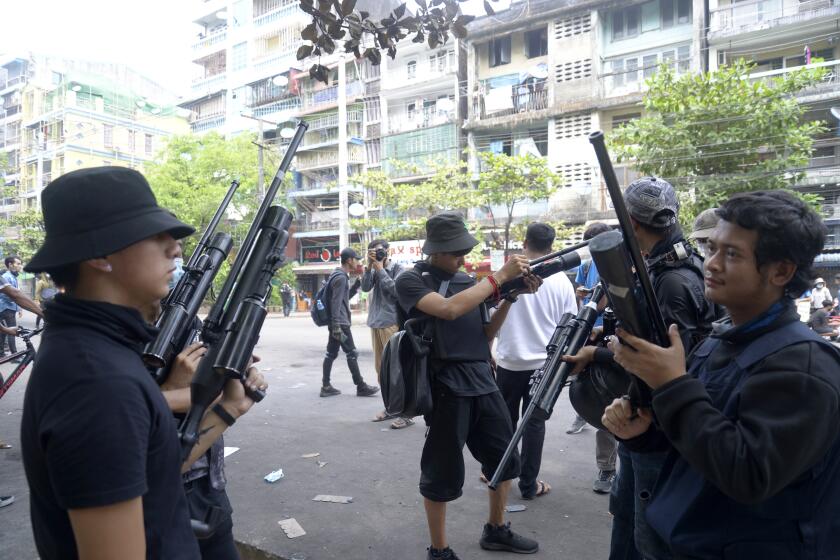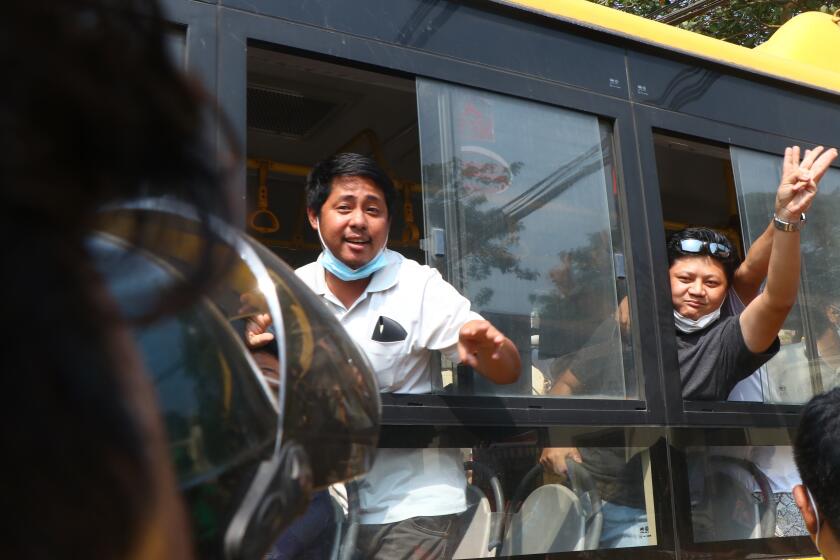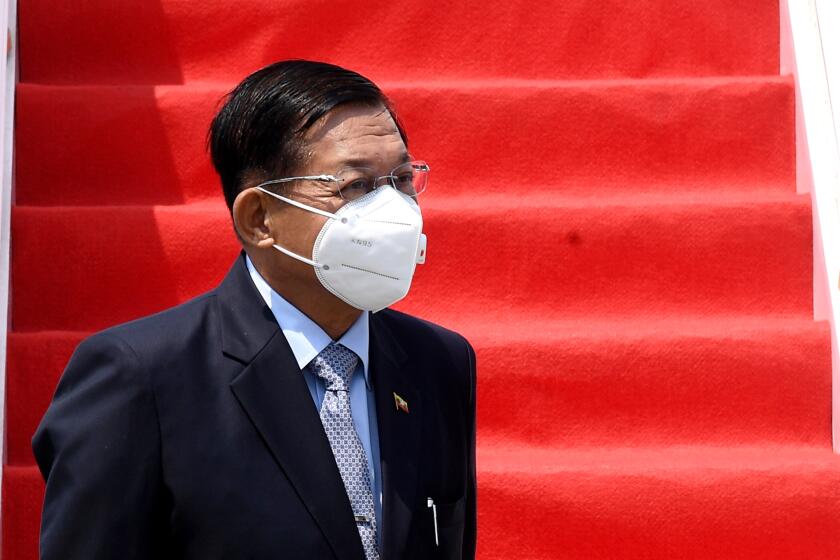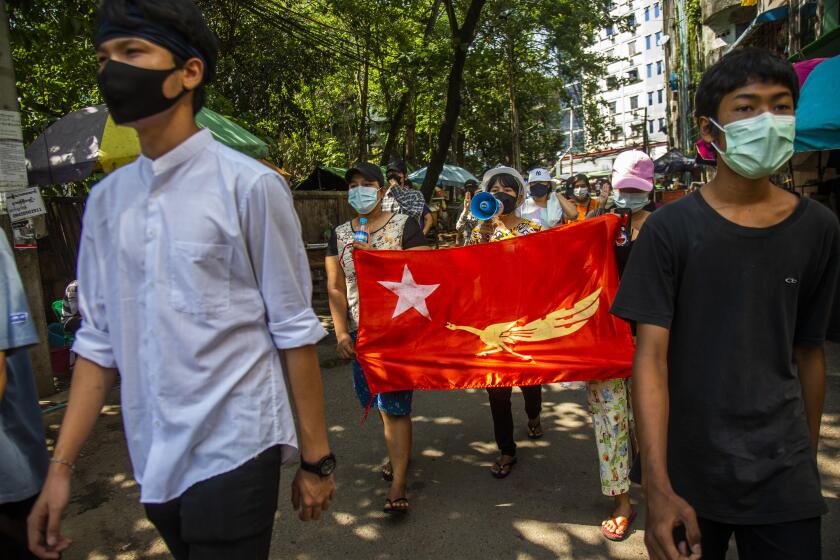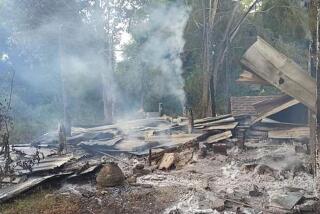Boys and young men disappear in Myanmar militaryâs crackdown
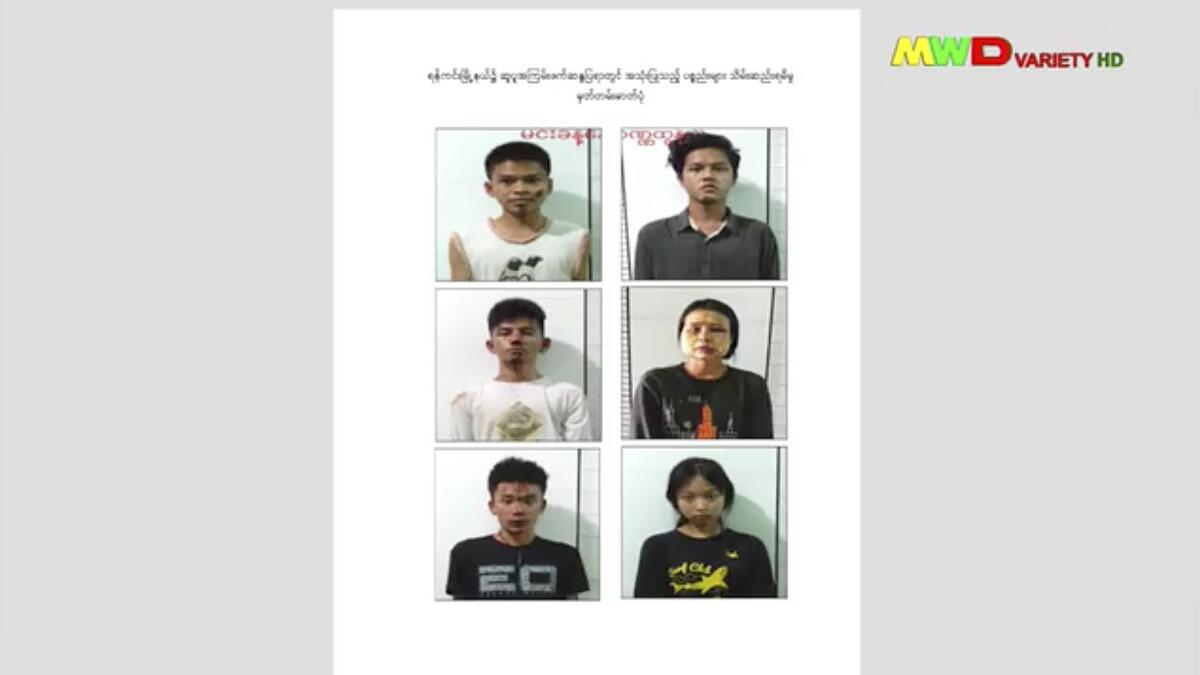
JAKARTA, Indonesia â Myanmarâs security forces movedâ¯in, and the street lamps went black. In house after house, people shut off their lights.
Huddled inside her homeâ¯in Yangon, 19-year-old â¯Shweâ¯dared to peek out her window. A flashlight shone back, and a manâs voice ordered her not to look.
Two gunshots rang out. Then a manâs scream: âHelp!ââ¯When the militaryâsâ¯trucks finally rolled away,â¯Shweâ¯and her family emerged to look for her 15-year-old brother, who was nowhere to be found.
âI could feel my blood thumping,â sheâ¯recalled. âI had a feeling that he might be taken.â
Across â¯the country,⯠Myanmarâs security forces are arresting and forcibly disappearing⯠thousands of people, especially boys and young men, in a sweeping bid to crush a three-month uprising against a military takeover.â¯
In most cases,â¯the familiesâ¯of⯠those takenâ¯donât know where they are,â¯according to an⯠Associated Press analysis ofâ¯more thanâ¯3,500 arrestsâ¯since February. UNICEF, the United Nations childrenâs agency, is aware of about 1,000 cases of children or young peopleâ¯who have beenâ¯arbitrarily arrested and detained,â¯manyâ¯without access to lawyers⯠or theirâ¯families.
Anti-coup demonstrators are abandoning peaceful protest for armed resistance as the deposed civilian government appeals to ethnic rebels to join the fight. The United Nations warns of a âbloodbath.â
It is a technique that Myanmarâs military has long used to instill fear and crush pro-democracy movements.â¯The boys and young men areâ¯taken from homes, businesses and streets. Some end up dead.⯠Many are imprisonedâ¯and sometimes tortured.⯠Many more are missing.
âWeâve definitely moved into a situation of mass enforced disappearances,â saidâ¯Matthew⯠Smith, cofounder of the human rights group Fortify Rights, which has collected evidence of detainees being killed in custody.â¯âWeâre documenting and seeing widespread and systematic arbitrary arrests.â
The AP is withholding Shweâs full name to protect her from retaliationâ¯byâ¯the military.
The autobody shopâ¯inâ¯Shweâs neighborhood was a regular hangout for local boys.â¯On the night of March 21,â¯herâ¯brother had gone there as he usually did.
Protesters say labor strikes and civil disobedience are the only ways to dislodge the military dictatorship in Myanmar. It may mean pushing millions into poverty.
Asâ¯Shweâ¯approached the shop, she saw it had been ransacked.â¯Frantic,â¯sheâ¯and her fatherâ¯scouredâ¯the building for any sign of their beloved boy.
But he was gone, and the floor was covered in blood.
Ever since Myanmarâs military seized control in February,â¯faces of the missing have flooded the Internet. Recently, photos of young people detained by security forces also have begun circulating onlineâ¯andâ¯onâ¯military-controlled television,â¯their faces bloodied, with clear markings of beatings and possible torture.
At leastâ¯3,500 people have been detained since the military takeover began, more than three-quarters of whom are male, according to an analysis of data collected by the Assistance Assn. for Political Prisoners, which monitors deaths and arrests. Ofâ¯the 419 men whose ages were recorded in the groupâs database, nearly two-thirds are under age 30, and 78 are teenagers.
Indonesiaâs president says Southeast Asian leaders have demanded an immediate end to killings and the release of political detainees in Myanmar
Nearly 2,700 of the detainees are beingâ¯held at undisclosed locations, an AAPP spokesman said.
âThe military are trying to turn civilians, striking workers and children into enemies,â said Ko Bo Kyi, AAPPâs joint secretary. âThey think if they can kill off the boys and young men, then they can kill off the revolution.â
After receiving questions from the Associated Press, the military, known as the Tatmadaw, called a Zoom news conference, during which it dubbed the AAPP a âbaseless organization,â suggested its data were inaccurate and denied that security forces were targeting young men.
âThe security forces are not arresting based on genders and ages,â said Capt. Aye Thazin Myint, a military spokeswoman. âThey are only detaining anyone who is rioting, protesting, causing unrest or any actions along those lines.â
The United States is urging the international community to take âconcrete actionâ against the military in Myanmar â including an arms embargo and sanctions against its holding companies and those who profit from them.
Some of those snatched by security forces were protesting. Some have links to the militaryâs rival political party. Others are taken for no discernible reason.â¯They are typically charged withâ¯Section 505(A) of the Penal Code, which, in part, criminalizesâ¯any comments that âcause fear.â
Myanmar human rights activist Wai Hnin Pwint Thon is intimately acquainted with the Tatmadawâs tactics. Her father, famed political activistâ¯Mya Aye, was arrested duringâ¯a 1988 uprising against military rule,â¯and the family waited months before learning he was in prison.
He was arrested again during this yearâs military takeover.â¯It was two months before his family discovered he was being held at Yangonâs notorious Insein prison.
âI canât imagine families of young people who are 19, 20, 21 [and] in prison,â sheâ¯said.â¯âIâm trying to hold onto hope, but the situation is getting worse every day.â
Start your day right
Sign up for Essential California for the L.A. Times biggest news, features and recommendations in your inbox six days a week.
You may occasionally receive promotional content from the Los Angeles Times.
The militaryâs scare tactics have provenâ¯enormously effective.⯠Across the country,â¯residentsâ¯regularlyâ¯take turns holding night watches, banging pots and pans or yelling to neighbors from the streetâ¯if soldiers or police are spotted.
âI am more afraidâ¯of beingâ¯arrested than getting shot,â said one 29-year-old man who was arrested, beaten and later released,â¯and who spoke on condition of anonymity to avoidâ¯retribution.â¯âI have a chance of dying on the spot with just one shot. But being arrested, I am afraid that they would torture me.â
In Yangon,â¯Shweâ¯tried to convince herself that the blood on the floor of the shop wasnât her brotherâs.
He and three other young men from the shopâ¯had been hauled away.â¯Neighbors said security forces may have targeted the boys because they spotted someone inside the shopâ¯with a steel dart slingshot.
Asia policy: U.S. sanctions have left the rights-abusing junta unbowed but vulnerable to Beijing.
At 2 a.m., a police officer called to sayâ¯Shweâs⯠brother wasâ¯atâ¯a military hospital and hadâ¯been shot in the hand.
Shwe⯠said her family told the police that her brother was underage. But on March 27, they learned that her brother and the three others had been charged withâ¯possession of weapons and sentenced to three years in prison.
They were allowed one brief phone call with him when he was first hospitalized, and nothing since. Shwe â¯remembers hearing her brotherâ¯tell their anguished mother: âI am OK.â
Shwe â¯has no idea if that is still true.⯠Sheâ¯worries forâ¯her brother, a quiet boy who lovesâ¯playing games.⯠She worries, too,â¯forâ¯their mother, who cries and cries, and forâ¯their father, whoâ¯achesâ¯for his only son.
For now, they can do little more than wait and hope: That he wonât be beaten. That he will get a pardon. Thatâ¯the people ofâ¯Myanmar will soon feel safe again.
âEven though we are all in distress, we try to look on the bright side that at least we know where he is,â she said. â¯âWe are lucky that he was only abducted.ââ¯
More to Read
Sign up for Essential California
The most important California stories and recommendations in your inbox every morning.
You may occasionally receive promotional content from the Los Angeles Times.
